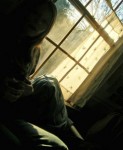I rue that my mother spent most of the last month of her life in in a woefully small and dispiriting room, a room so drafty–could this truly be the room allotted to a patient with respiratory disease?–that pillows were banked against frost on the inside of the window.
The room was, in truth, a dump: chaotic, slovenly, every surface choked with clutter. There was barely space to pull up a chair up alongside her oxygen tanks and special bed. The television was nearly buried under tubes and and pads; the closet blocked by a nebulizer stand. With her nightstand jammed in a corner away from the bed—at least until I commandeered one of the aides to help me shoehorn it back next to the bed–, even my mother’s blanketed form became a repository for miscellany: Extra sheets and clothing were heaped on her legs, a brush and magazine on her belly, a heavy blue telephone wedged against her side. The vases of flowers I brought disappeared under a heap of towels. The photos I gave her vanished into a drawer, or under the bed, along with the cheerful cards I left out so that my memory-impaired mother would know I had been there and would return.
We would have 9-12 months, the doctors had told us. We knew it was not a promise. Still, they were off by a good mile. When I came to know this for certain was on a bitterly cold evening in late January five days before my mother died. On what turned out to be my mother’s last Saturday night in the world, I spent six poignant hours with my mother in her appallingly disheveled room, her bed in blue-tinged and weary-looking fluorescent brightness, my chair in shadows, blankets tacked over drafty windows, CNN on the television, our voices rising and falling softly in intermittent conversation, aides coming and going, frost gathering on the pane and dripping onto the floor.
When I arrived in her doorway at about 4:30, my mother was sitting up in her bed. Cradled in her left hand was the little stuffed bear I’d brought to her in the hospital. Her head was tilted down slightly to look at it, and she was stroking its contemplative brown face with the fingers of her right hand.
She’d been glad to see me. “Well, if it isn’t my darling daughter!” she said, beaming an expansive smile toward me. She was in her usual white hospital gown with the small blue flowers; a blue knit warmup jacket I’d brought her was crumpled around her thin shoulders. She looked clean, and –did I imagine it?–there was a hint of color in her cheeks. Her white hair, in its pert new bob, looked soft and fetching. The TV was on, loud–CNN’s anchors segueing from a suicide bombing in Somalia to the remarkable tale of the American Airlines jet that had recently landed, improbably, on New York City’s Hudson River, its passengers clambering to safety in the most literal way on a wing and a prayer.
The indelibility of that night. The desultory but companionable quality of it. The heartening perk and wit of my mother, no matter the usual repetition of her loop-de-looping memory. Her entertaining stories, though none of them new, of her happy childhood years. My efforts to improve her disastrous room, sweeping towels and tubes into drawers, unearthing cards and photos, cramming pillows against the frosty windows. Aides bringing in dinner, meds, rags to mop the puddles of melting frost near the window; eventually, taking note of my mother’s worsening cough (“It really is cold in here,” a handsome young aide named Lucas comments) they wheel in a space heater. My fury about the egregious unsuitability of the room, though I hide it from my mother.
My mother’s mildly monotonous chime of reiterated questions about what I’d been up to making a surprising turn: She wanted to talk about my work, did I still like being self-employed, what had I been working on lately, was I still making a go of it ten years in. She expressed pride that I had struck out on my own (“You’re your own boss … you’re self-sufficient; that’s wonderful,” she’d remarked, as I basked in her interest and the sudden clarity of her mind). Then, more remarkably, her trenchant interest in the nuts and bolts of self-employment: did I have a sufficiently sturdy retirement plan? “I worry about you,” she said.
“Don’t worry, Mom,” I replied.
“I worry about you,” she repeated. “I wish I could help you. I would if I could.”
The surprise of that exchange … and then the heartrending crisis, the moment when she discovered she had no vision in her right eye—her one good eye! she said in a plantive and panic-edged voice. The summoning of aides, the late-night visit of a hospice nurse, the doses of ativan and dollop of morphine. The sitting by my mother’s bed as she grew drowsy, as I flipped channels, as she suggested maybe I could stay all night, as she told me in a playful but poignantly small voice that she didn’t want to leave.
And then the end of it: The sitting in the darkened lobby with Laura, the hospice nurse with the mien of someone who lived alone and cared too much, the empathic on-call angel who’d ventured out late on a bone-chilling January night to answer my tormented call about mother’s eye. Laura had waited for me in the lobby as I said goodnight to my mother. We sat in facing wingback chairs in murmured conversation before heading to our cars.
I was bone-tired and heart-heavy and deeply unsettled. My mother’s heartrending anxiety about the loss of her “one good eye” (which the hospice nurse ascertained had happened some time ago, probably a result of the bleeding disorder; it seemed my mother kept forgetting and rediscovering it). Her touching plaintiveness, tugging me to stay. And what of her unexpectedly lucid preoccupation with the state of my 401K? It seemed to have come out of nowhere.
“Well,” Laura answered in her hesitant, gentle way, “I think that maybe what your mother was really doing was expressing her need to know about whether you’ll be alright when she’s gone.”
I choked up, tears streaming, the truth of it unfurling within me. “It’s very common toward the very end in hospice patients,” Laura was adding. My heart lurched; everything in me went heavy and soft. Yet this was something I’d already known, I realized. “We’re not talking about 6-9 months, are we?” I finally croaked out.
“Oh, heavens no,” Laura said, her voice soft. She saw that I was shivering, and covered my cold hand with her warm one. My mother was profoundly, even impossibly frail, she said; frightfully tiny, almost nothing left of her, breaths so hard and wispy, so little fuel for a famished heart. “I was shocked by the feebleness of the woman I saw when I walked into your mother’s room.” Six to nine months–“I’m so sorry, Mia, but no.”
The truth of it. But … “But she was so cheerful,” I said to Laura. “She was so amazingly lucid.” Not just that. ” She was so upset about losing her eye–her one good eye, she kept saying: ‘What am I going to do without my eye?’ That’s what she said.” Her anxious, woeful laments about her eye had cut me to the quick; the loss of her vision, and her rue about it, somehow seemed the cruelest of all the hard, sad things that had unfolded in the past few years.
Her strangled breaths, her shredded lungs, her vanishing bones, the oxygen tether, the wayward shamblings of her bladder and bowels, the shrinking of her life to a circumference barely bigger than her bed–none of the trials and indignities that had befallen my mother seemed as painful, as cruel, as significant, as the failing of my mother’s vision.
My mother the voracious reader, the inveterate camera-clicker, the eager observer of the world beyond her door; my mother the lover of extravagant blooms and vivid hues and the endless variety of the human face—“no two alike!” she would marvel. My mother with her treasured morning newspaper, her CNN, her calming bedtime tea of Everybody Loves Raymond or reruns of Frasier; her heaps of photo albums and scrapbooks: the lovely silver-toned pictures from her vibrant early years, the fuzzy Kodacolor snaps that she culled into a bright and glossy record of all that came later.
“She still wants to see things,” I said again to Laura. “She wanted me to leave the door open. She’s so much better than she was in the hospital.”
Laura was quiet, her gaze level and kind and, I noticed, glistening in the corners.
“”She was so wistful and hopeful about her eye,” I reiterated. “She kept asking if it could be fixed.” Even as I rattled on, though, I knew. And it came to me then that some part of my mother, witting or not, quite possibly also knew. “What am I going to do without my good eye?” she had asked with such plaintiveness. “Will I get it back?” “We don’t know,” Laura had answered simply, with touching tenderness. “I hope so.”
My mother had been quiet for a moment. When she spoke, she sounded small and possibly scared. But what she uttered next was not another distressed lament about her eye. “Will you pray for me?” she’d asked.
A short time later, as I kissed her goodbye, as we exchanged “I love yous,” she’d asked again if I might stay. “I’ll be back tomorrow,” I reassured her. “Will you?” she’d asked, the question–edged with urgency, the hint of a plea—startling me. “I’m counting on you,” she said. The unfamiliar and disconcerting unease in her, something small, woebegone, little-girlish newly floating in this wrenlike white-haired wraith who was so heartbreakingly my mother. As I turned toward the door she called to me once more. “Can you leave the light on?” she had asked.
I knew. The heaviness of it. The deep ocean of it. The dead certainty of it. “I’m so very sorry, Mia,” Laura was saying again as we sat in a shadowed lobby on what proved to be the coldest night of the year. In the window over her shoulder I saw the glow of a large winter moon, nearly full, on the snowy parking lot. “I know this is very hard to hear,” Laura continued gently. “But I can’t imagine your mother lasting more than a month. Probably less.”
 But for some reason I don’t understand well, I just can’t revisit any of these experiences yet, at least not in any more depth than I have already managed to do. The memories are intense; some are comforting but on the whole they are heavy with disquietude. They go to the core of my grief, with its thick gumbo of sadness and regret and longing and guilt and anger and love stretching back to childhood and into the pain of now and into the unknown and the unfathomable. Writing about these profound memories will very likely be cathartic and clarifying, but right now it feels overwhelming.
But for some reason I don’t understand well, I just can’t revisit any of these experiences yet, at least not in any more depth than I have already managed to do. The memories are intense; some are comforting but on the whole they are heavy with disquietude. They go to the core of my grief, with its thick gumbo of sadness and regret and longing and guilt and anger and love stretching back to childhood and into the pain of now and into the unknown and the unfathomable. Writing about these profound memories will very likely be cathartic and clarifying, but right now it feels overwhelming.









 She dressed only to please herself, to be sure, having taken in few fashion cues, or clues, in several decades. Her ideas of style seemed to harken back to 1960, to a time when sleek plaid slacks were just the thing for getting together for bridge, mixing a cocktail, trying the twist. But you could see the effort she made, mixing and matching those slack-and-jacket ensembles into her eighties. The gulf between her and Naomi Campbell was clearly vast; she seemed from a different millenium and galaxy than the women of, say, Project Runway. But she was always tasteful and on her own terms, coordinated; black or navy slacks on the bottom, white blouse or turtleneck on top, rarely chancing a pattern bolder than a calico, sticking mostly to safe tweeds and burgundies (and the odd red, in which she looked radiant). She always took the trouble to accessorize. If the overall effect–especially on her tiny and increasingly stooped body–tended to kitsch, it was also true that she was occasionally darling.
She dressed only to please herself, to be sure, having taken in few fashion cues, or clues, in several decades. Her ideas of style seemed to harken back to 1960, to a time when sleek plaid slacks were just the thing for getting together for bridge, mixing a cocktail, trying the twist. But you could see the effort she made, mixing and matching those slack-and-jacket ensembles into her eighties. The gulf between her and Naomi Campbell was clearly vast; she seemed from a different millenium and galaxy than the women of, say, Project Runway. But she was always tasteful and on her own terms, coordinated; black or navy slacks on the bottom, white blouse or turtleneck on top, rarely chancing a pattern bolder than a calico, sticking mostly to safe tweeds and burgundies (and the odd red, in which she looked radiant). She always took the trouble to accessorize. If the overall effect–especially on her tiny and increasingly stooped body–tended to kitsch, it was also true that she was occasionally darling.